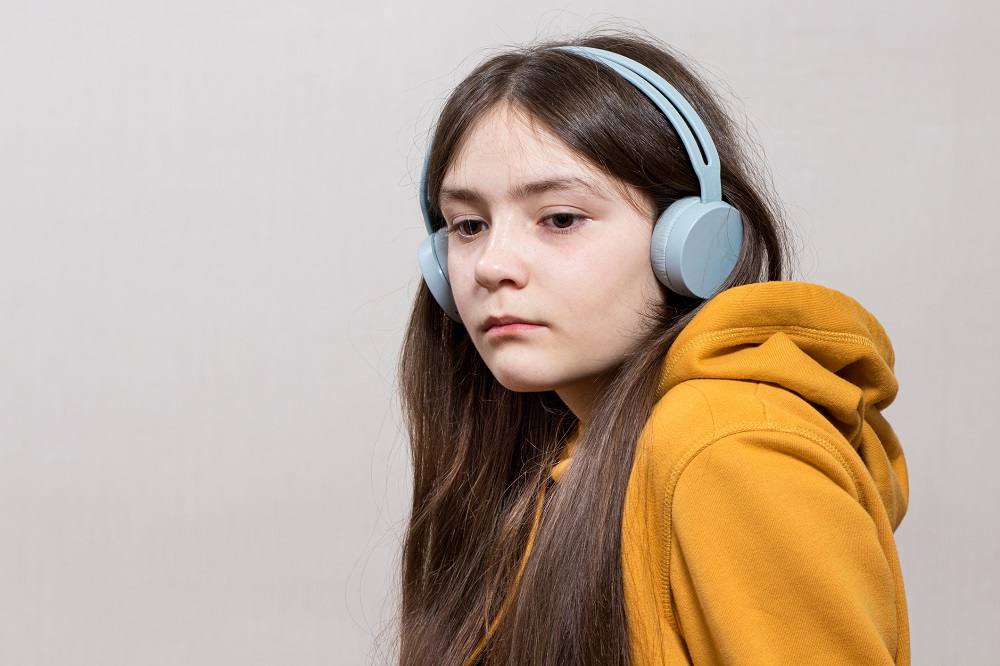Being a teenager can be tough, and many teens can feel anxious or worried at times. However, if your teen is autistic, or has ADHD, dyslexia, Tourette’s Syndrome or is in any way neurodivergent they may be more likely to experience anxiety than other young people their age and may express themselves in different ways. Here we have some tips to provide a supportive environment at home, school or in the community.
Our page on children and neurodiversity explains more about the different neurodivergence.
Neurodivergent teens and anxiety
If your child is neurodivergent it means their brain takes in and responds to inner and outer sensations and experiences in a particular way that might be different to the majority of their neurotypical peers. The world is often designed for neurotypical people, rather than taking account of the needs and preferences of the full range of neurotypes in our society.
From exam stress to relationship pressures, there are lots of things that can cause anxiety during the teen years. But if your child is neurodivergent they may find the teen years even more unpredictable and distressing.
For example:
- Neurodivergent teens may find changes, such as changes to their body or to their daily routine unpredictable and upsetting.
- Everyone has different communication and social preferences. Many neurodivergent people prefer direct or literal communication and may not rely on non-verbal signals like body language or eye gaze. If we only consider neurotypical expectations we might think that neurodivergent young people have social and communication difficulties. This can make communication between neurodivergent and neurotypical teens tricky. You may wish to read about ‘double empathy’ – research suggests that often people of the same neurotype have the most successful communication experiences. Mismatches or misunderstandings can occur more often on both sides when neurotypes are mixed.
- Social anxiety can arise from experiences of being misunderstood, feeling like you always get it wrong, masking to fit in and being in situations which are unpredictable, where people don’t do what was expected or which don’t meet your sensory needs. Consequently neurodivergent teens are more likely to experience social anxiety.
- Neurodivergent teens may find schoolwork and exams more stressful.
- Many autistic teens may consciously or unconsciously ‘mask’ – hide their true or authentic self – in order to fit in, or avoid stigma. This can be exhausting and can make them feel more anxious. You can read more about masking on the Enquire website.
- Similarly teens with Tourette’s syndrome may be able to control their tics in social situations, but this too can be very tiring.
How can I tell if my teen's feeling anxious?
You know your child best and how comfortable they are with talking about their feelings and emotions. It can be good to encourage your teen to talk to you about how they feel, if you know this is something they might be comfortable with. Our page on talking and listening to your teen has tips to get the conversation going.
However, neurodivergent teens may find it harder to identify and express how they’re feeling, or they may not want to share their feelings with you. So it’s a good idea to keep an eye out for signs that they may be feeling anxious. Anxiety in a neurodivergent teen can present quite differently to others.
As well as common signs of anxiety like disrupted sleeping and eating habits, neurodivergent teens may show this in a range of ways, some of which might be unexpected.
Autistic teens
Autistic teens may have emotional regulation strategies which help them feel less anxious like ‘stimming’ (making repetitive movements or noises like hand flapping, rocking back and forth, humming or repeating the same phrase over and over) and focusing on their interests that help calm them if they’re feeling upset or overwhelm. If you notice an increase in these actions and responses, it may be a sign that your teen is feeling anxious but also that they are finding successful ways to regulate themselves.
You may also notice that your child shows signs of distress. For example, they may experience:
- situational mutism – not being able to use spoken words in some contexts due to anxiety.
- meltdowns – these are strong reactions that might seem to come out of nowhere, often misunderstood as tantrums. A meltdown is not a conscious behaviour that can be changed but rather an uncontrollable response to overwhelming feeling: a physical reaction to an overwhelmed brain.
- shutdowns – these are internal expressions of distress and although they are equally distressing to experience, they are frequently unnoticed by those around the neurodivergent person.
- burnout – this has been described as the shutting down of mind and body and manifests as long-term exhaustion, loss of ability to operate in ways they previously did, being unable to mask and reduced tolerance for some sensations or environments. This can be mistaken for depression or low mood.
You and those around them might observe their actions and responses to be more challenging when they’re anxious and when the environments they are in do not meet their sensory and communication needs or their need for predictability.
You can find out more about stimming, interests and meltdowns on the National Autistic Society website.
Teens with ADHD
A lot of the symptoms of anxiety are similar to the signs of ADHD, like feeling restless and edgy, being unable to concentrate and being quick to react and impatient. Their brain may also race and it can make coping with day to day things much harrder, So if your teen has ADHD keep a look out for these symptoms becoming more noticeable – this may be a sign of anxiety. This guide for young people from YoungMinds has more information on ADHD and mental health.
Teens with Tourette’s syndrome
If your teen has Tourette’s syndrome, you may notice their tics become more frequent or severe if they’re anxious.
Tips for helping neurodivergent teens cope with anxiety
Tip #1: Stick to a routine as much as you can
Neurodivergent teens benefit from predictability and can find changes to their routine hard to cope with. So keeping things as calm and predictable as you can at home will help them manage any anxiety.
Tip #2; Help them prepare for events that may trigger anxiety
You may notice that certain things are more likely to trigger anxiety in your teen. For example, autistic teens may get anxious about changes to their routine or social events, especially if these are unexpected, while dyslexic teens may find exams particularly stressful.
So try to help them prepare for any events that are likely to cause them stress. For example, you could:
- try to find out what they are worried about and make plans to address or avoid these things
- talk through what they can expect and make sure the adults around them understand your child’s expectations
- use social stories or visual supports to show them what to expect
- remind them of times in the past when they have enjoyed similar experiences or managed well
- practise things to do to help them get through the event or to take a break or leave before it gets too much
- be careful not to encourage your child to mask discomfort or distress.
Tip #3: Ensure they're comfortable in their environment
If you know that things like loud noises or crowds upset your child, you can help them avoid these, for example, by suggesting they wear noise-cancelling headphones or travel at off-peak times.
If your child is neurodivergent social anxiety is often quite common. Autistic teenagers for example may prefer being in small groups of people or only with people for a one to one. They may also prefer being in familiar places, like their own home or a close friend’s home. It can be unhelpful to encourage them into busy social situations as this can make their anxiety much worse and lead to masking. The best thing is for them to be environments they are comfortable with.
Tip #4: Help them find ways to feel calm and grounded
We have lots of tips to help teens keep calm which you can try with your teen. In particular things like breathing exercises, and grounding techniques may help some neurodivergent teens with their anxiety. If they have an interest, a collection or a hobby, having some quiet time to focus on this may really help. If your teen has ADHD they may find that exercising regularly or engaging in an activity they like is important to help them stay calm.
Tip #5: Help them manage their energy levels
If your teen is neurodivergent they may find things like social interactions, trying new things or just navigating everyday life exhausting and draining. But they may find activities, like walking outdoors or reading a favourite book, or having quiet time on their own help them calm down and recover their energy.
To help your teen manage their energy and help prevent them getting burnt out, you could look at the energy accounting guide from the National Autistic Society. This explains how to manage their energy by balancing the things they find draining with the things they find help them have more energy.
Help and support
If you’re concerned about your teen’s mental health, your GP is there for you. They may be able to recommend supports that will help.
You can also find help and support through the following organisations:
- Scottish Autism
- National Autistic Society
- Scottish ADHD Coalition
- Dyslexia Scotland
- The Dyscalculia Information Centre
- The National Handwriting Association (for information on dysgraphia)
- Tourette’s Action
- Raising Awareness of Developmental Language Disorder (resources and support for parents of children with Developmental Language Disorder, which commonly co-occurs with other neurotypes)
- YoungMinds (mental health advice and support for young people and their parents and carers)
- Enquire (the Scottish advice service for additional support for learning)
- Scottish Commission for People with Learning Disabilities (resources to help people with learning disabilities cope with anxiety – these were created during the pandemic but are still relevant now)
- Disability Information Scotland (to find local support in your area for a range of conditions)
 Activities & Play
Activities & Play Behaviour
Behaviour Childcare
Childcare Development & Growing Up
Development & Growing Up Family, Friends & Relationships
Family, Friends & Relationships Feeding Your Baby
Feeding Your Baby Food & Eating
Food & Eating Health & Safety
Health & Safety Mental Health & Wellbeing
Mental Health & Wellbeing Money & Work
Money & Work Online Behaviour & Safety
Online Behaviour & Safety Pregnancy & First Days
Pregnancy & First Days School & Education
School & Education Sleep
Sleep








 Behaviour
Behaviour
 Family, Friends & Relationships
Family, Friends & Relationships